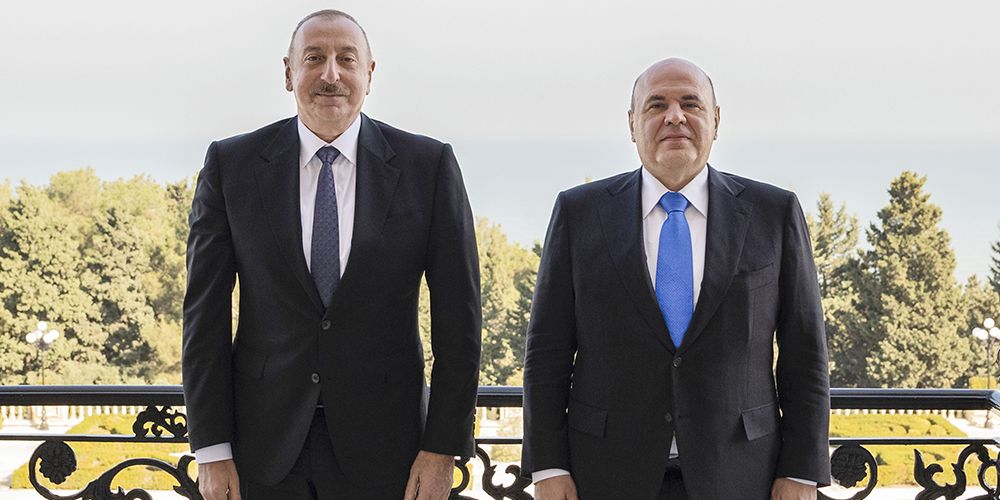Search

Publications
Russia Ц Azerbaijan: new transport and energy agenda

The 11th Azerbaijanian-Russian Interregional Forum took place in Baku amidst the geopolitical and economic environment critically complicated for the entire Eurasian region. At the same time, the crisis associated with formation of the new multipolar world may represent a new chance for the multifaceted growth in the Caspian Sea and Southern Caucasus, the so-called «window of opportunities»: RussiaТs intent to develop sustainable transport, economic and humanitarian ties in this region will turn out an impetus for many projects and the qualitative growth of the regional economy.
We can observe the several-fold increase of the inter-departmental contacts with Russian participation in the Caspian Region. The bilateral relations are being modified and combined within the «Caspian Five» format to form the common regional agenda for industry and investment, transport and trade. They cannot be imagined separately any more.
At the meeting of Ilham Aliyev, the President of Azerbaijan, with Mikhail Mishustin, the Chairman of the RF Government and the head of the Russian delegation at the 11th Interregional Forum, on November 18, they discussed the progress of implementing a series of very important trade and economic agreements between Moscow and Baku.
Russian-Azerbaijanian interaction parameters and joint projects status by 2022
Redirecting trade flows from Europe to the Black Sea and Southern Caucasus allowed for bringing the mutual trade volume up to the level before the Pandemic (approximately USD 3.4 bn for 10 months of 2022, i.e., 20% growth). And the cargo transportation volumes already exceed the best 2010s records (5,4 Mt in January-October).
The RF maintained the position of one of the top-three foreign economic partners of Azerbaijan: about one thousand joint ventures are operating in Azerbaijan, and 300 of them are 100% owned by Russian entities.
By 2022, Russian investors were implementing 20 projects in Azerbaijan with the total budget exceeding USD 2 bn. During the period between 2015 and 2021, the accumulated investment from Azerbaijan into the economy of Russia grew more than 4 times: from USD 149 mln up to USD 633 mln, and from Russia to Azerbaijan Ц more than 3 times: from USD 65 mln up to USD 208 mln. In absolute numbers these metrics do not look very impressive, but their role for the overall Azerbaijanian economy should be taken into account.
The commercial trucks (GAZ Group) assembly plant, the helicoptersТ service and maintenance center (Vertolyoty Rossiyi JSC), manufacturing NOVA 340 harvester-threshers (Rostselmash LLC), railcars supplies (Altaiwagon JSC) Ц these are the flagship projects of Russian business for the recent 3 years.
At the Interregional Forum, the head of the RF Ministry of Economy announced that the Russian manufacturer of the expandable polystyrene heat-insulation boards (Penoplex company) plans to resume the construction of their manufacturing site in Hajiqabul, which they started in 2019 and then froze for the Pandemic. The project investment were estimated as USD 6.5 mln, the production yield was planned as 100 thou cubic meters per annum. This will be the fourth Penoplex site in CIS.
In 2022, a series of major deals were closed, for example, the rail supply agreement between PC EVRAZ and CJSC Azerbaijanian Railways (ADY) for USD 25 mln. The KAMAZ servicing center construction in Jabrayil regions was completed in June.
It is also worth noting that Russian companies started getting government procurement contracts for reconstruction of the newly liberated territories in Karabakh and East Zangezur (17 projects are currently under review).
On top of that, one of the very important transportation project of Russian Railways started in 2022 uniting Russia and several CIS countries Ц Agriexpress. Russian Railways Logistics company and Alliance Logistics LLC from the Azerbaijanian side achieved an agreement on cargos consolidation and organizing haulage in covered r/w cars and containers, as well as on provision of the coordinated discount vs. the full logistics tariff. Currently the tariffs were formed for Samur-Derbent route (fruit and vegetable) in covered r/w cars and Sumgait-Moscow/Vorsino/Rostov (polypropylene) вin containers and covered r/w cars. When developing tariffs for other types of cargos, one-off requests from exporters will be processed and individual calculations may be made for each shipment.
Sectoral experts assess the cargo base for Agriexpress project in the Western segment of the North-South ITC as 60 kt per annum. This is a very profitable area from the standpoint of the delivery timeline and volumes, especially for transportation and transshipment of grain, fruit, chemicals and petrochem products. By 2025, the volume of transported cargos may be ramped-up to 100 kt.
Finally, another important event of this year in the sphere of administrative coordination: agreement on establishing the Cooperative Ties Center between Russian MSP Corporation and the SME Development Agency of Azerbaijan (KOBIA). The Cooperative Ties Center will be a permanent mechanism of SME support in both countries to enter the Russian and Azerbaijanian markets, as well as to enter the markets of other countries.
Pursuant to this document, the parties agreed to promote procurement by major companies from both countries from SME entities, to assist SME entities in their integration into the major companiesТ value chains and in organizing SME products supplies to retail chains. Modern Russian digital technologies and platforms will be used to achieve this.
Western segment of the North-South ITC
By November 2022, pursuant to assignment of President Putin, the RF Government developed a detailed Road Map for ITC development. Naturally, this topic should be viewed in the context of interaction with Azerbaijan and Iran.
The optimal Road Map scenario stipulates that by 2030 the volume of Russian cargos along all the routes of the ITC will almost double Ц from the current 17 Mt up to 32 Mt. The Baku Declaration of the Transportation Ministries of Russia, Azerbaijan and Iran dated 9 September 2022 stipulates by 2030 to increase the throughput capacity of the Western segment of the North-South ITC from the current 9 Mt up to at least 15 Mt.
What does it mean in practice? Approximately eight-ten trains per day both for bulk cargos and for containers.
Approximately, 15 Mt in container equivalent means 577 thou TEU (in case of 20-feet containers maximum 26 t net each), this means 288 thou r/w platforms. In other words, 3,200 trains 90 platforms each approximately means 8.76 trains per day.
If we take bulk cargos, 15 Mt means 250 thou r/w cars 60 t each corresponding to 2,778 trains 90 r/w cars each Ц approximately 7.61 trains per day.
Basically, these numbers are quite achievable in near future, but only at the Russian-Azerbaijanian section of the ITC. During 9 months of 2022, the railway traffic between Russia and Azerbaijan achieved the level exceeding 5.4 Mt, which is 57% above the level of the same period of the last year. Automotive traffic between the two countries during 6 months of 2022 achieved the level of 1.5 Mt, which is three times above the level of the same period of the last year.
If we take the entire Western segment of the North-South ITC including Iranian railways, the situation is much more complicated.
The Russian Road Map of the ITC development stipulates for the following four areas of active interaction between governments and businesses of the three countries to debottleneck the existing constrictions:
1. Railway infrastructure development
The plan is to finish the construction of the incomplete section of the Resht-Astara railway in Iran reaching the Persian Gulf ports. The optimal version is to build the broad-gauge railway (1,520 mm) allowing for re-locating the transshipment of containers and cargos from Astara on the Iranian-Azerbaijanian border to the terminals in Resht.
The other option of railway transportation development is to build the 1,520 mm gauge line directly to the Persian Gulf ports. Currently, the Iranian and Russian experts are busy evaluating the costs of different project options.
2. Synchronizing the development of motorway infrastructure and checkpoints on the borders
In 2022, the throughput capacity of the check-point on the Russian-Azerbaijanian border was increased up to 1,000 vehicles per day. The plan is to upgrade the main check-points so that by the end of the next year their throughput capacity achieves 1.7 thou vehicles per day, and by 2026 Ц 3 thou vehicles per day.
However, in addition to the infrastructural solutions a set of measures to minimize the barriers and УseamlessТ traffic assurance is required. The issues of non-discriminating access of traffic participants to using the roads, of unimpeded transit assurance and of the tariff policy coordination are critically important.
The solutions already gained their maturity, hence, the agreement between the governments of Russia and Azerbaijan «On cooperation and interaction to coordinate the development of check-points at the border between the two countries» was executed during the 11th Interregional Forum.
Another important event was signing the MOU between the RF Ministry of Transportation and the Azerbaijan Ministry of Digitalization and Transportation about cooperation in training and re-training of specialists in the transportation sphere. Baku is taking into account the leadership qualities of the Russian logistics school and will be based on Russian sectoral management models.
3. Digitalization
Moscow and Baku are actively searching for solutions to simplify the customs clearance procedures, fine-tuning the payments and mutual settlements mechanisms, solutions to the deals and cargos insurance provision by national insurance companies and switching to the electronic document flow.
In mid-November Ilham Aliyev signed the law on Azerbaijan joining the additional protocol «On the electronic CMR note (bill of lading)» of the Convention of Contracts for International Cargo Transportation. Basically, this was one the legal deficiency impeding the solutions for optimization of cargo movement controls. Joining this document will create the conditions for Azerbaijanian shippers to use electronic CMR notes (e-CMR) of the international standard.
In this connection we may remember that in 2019, during the visit of Mehriban Aliyeva, the First Vice-President of Azerbaijan, to Moscow the decision was made to develop additional Road Map for digitalization in the joint projects.
4. ITC single operator
Moscow offers Baku and Teheran to explore the possibility of establishing a single operating company for the three countries covering the entire Western segment of the ITC, which may be engaged not only in organizing transportation and transshipment in sea ports, but also in customs clearance and other supporting services. Basically, Russian Railways and ADY have sufficient reserves and capabilities for developing the railway corridor, plus their economic interests are similar. In its turn, Iran is interested in creating and end-to-end delivery route in its territory, but under Iranian economic control.
The common objectives for Moscow, Baku and Teheran are as follows: create the common space for interconnections of the value chains (plus the import phase-out), enhance mutual trade and transit, expand the transportation networks. New companies and facilities will be founded within this model in the Western segment of the North-South ITC.







